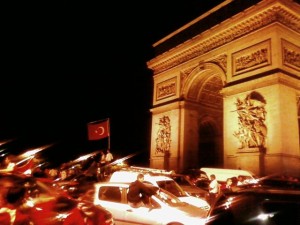
One of the problems Return to Order points out is that everything is seen through the lens of economics. This is precisely how the European economists see the refugee crisis. The economists ignore for the most part how the refugees invading Europe are Muslim and therefore have a completely different culture to Europe’s – if you can call theirs a culture. But economists such as the ones at Credit Suisse say that it makes “economic sense to let them in”.
Islam vs. the West
In a report by Nicolai Sennels, the Danish psychologist lists several differences between Muslims and non-Muslims. Muslims view anger, honor, and integration, among other things, very differently from Westerners. This leads to serious social problems.
Anger
“One very big difference between Muslims and Westerners concerns their views of anger. In our Western culture, anger is generally seen as a sign of weakness and lack of control and good style. Whoever experienced the embarrassment of expressing strong anger during, for example, family dinners or at work knows that it often takes time and a conscious effort to regain one’s lost respect. We in general see it as childish and immature if people use threats and aggressive behavior to mark their dislikes and have things their way. Instead, we see peoples’ ability to use logical arguments, to compromise, to see the situation from our opponent’s side and their knowledge of the facts, and to remain calm when challenged as clear signs of strength and authenticity.”
Muslims see “these normal Western social tools for negotiation during social conflicts as signs of weakness. They [see] the lack of readiness to use threats and engage in a physical fight as a sign of fear.”
Honor
Muslims and Westerners view honor differently as well.
“In Western societies we see it as a sign of strength, personal authenticity and an honorable attitude if we are able to face criticism with a calm and clear attitude. Meeting criticism with hostility and threats, on the other hand, is seen as signs of insecurity and a lack of self-confidence. Muslims however think in the opposite fashion. What we in the West would categorize as an insecure and childish response to criticism is seen by Muslims as a fair and honorable reaction to unjust insults.”
Integration
Muslims simply do not feel part of society, whether it is German, French, or Danish. Fourteen percent in France feel more French than Muslim. Previous Muslim immigrants such as the Turks who came to Germany in the ’60’s and ’70’s never truly became part of German society but formed “parallel societies”. In a recent study by the Federal Office for Migration and Refugees they found that one in five Turks have poor German skills and 50 percent who had little contact with Germans. A study examining German Muslims in general found that only twelve percent “defined themselves as German”
[like url=https://www.facebook.com/ReturnToOrder.org]
Objection
Someone could object saying that economists should see the refugee crisis in an economic light since that is what they are. The answer is that economy and economics are not supreme values. There are other values in society that are much more important than economics that economists have to recognize. So while they may see the refugee crisis in an economic light, they must not forget to mention the cultural, social, and religious aspects.
Conclusion
While the refugee inundation of Europe does have economic implications the cultural, social, and religious aspects are much more important and cannot be ignored. As explained in Return to Order, economists “must have recourse to other sciences” since economics is limited. There are simply too many differences between Muslims and Westerners to allow them into Europe just for economic reasons.



